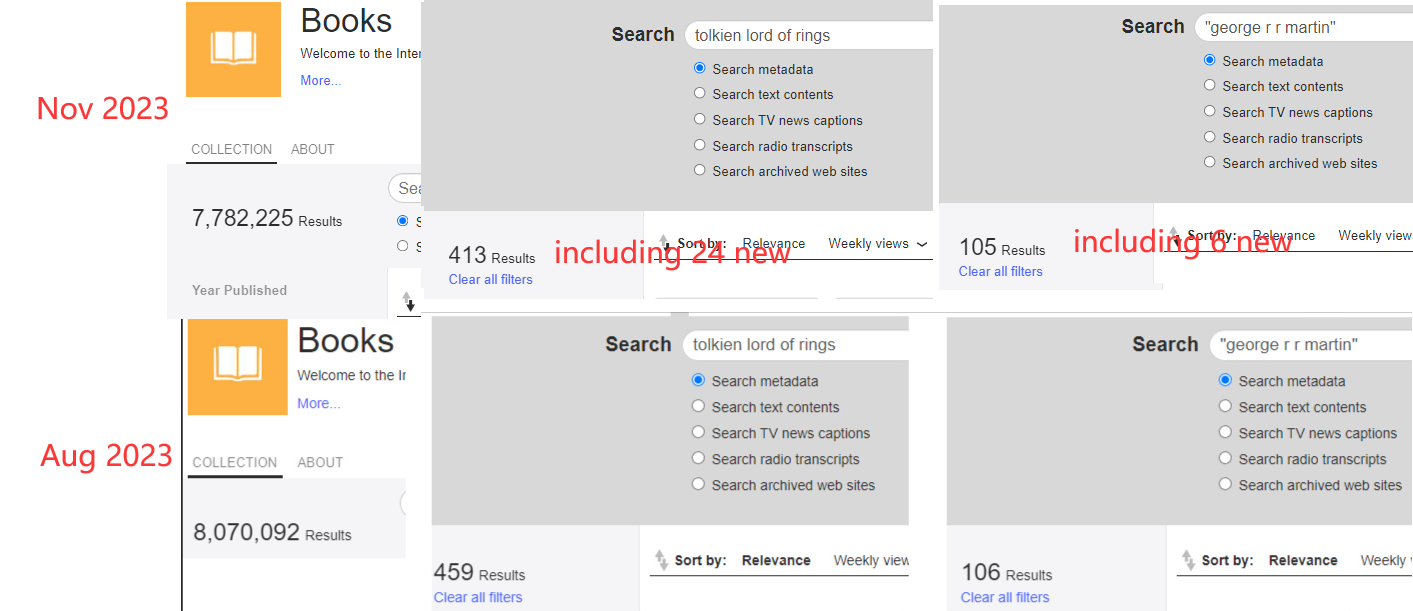Some more restrictions have been placed on the Internet Archive, in terms of lending and what they can digitize, which they plan to appeal.
They have also now been sued by the Music Industry for infringing copyright of hundreds of thousands of sound recordings.
https://torrentfreak.com/internet-arch ... ding-restrictions-230813/
I can also see legal battles over audiobooks on the horizon as well for the Internet Archive.
They have also now been sued by the Music Industry for infringing copyright of hundreds of thousands of sound recordings.
https://torrentfreak.com/internet-arch ... ding-restrictions-230813/
I can also see legal battles over audiobooks on the horizon as well for the Internet Archive.
As I have said previously, I like IA, but their head in the sand approach does nothing to argue their case (there isn't one). I use them quite often for grabbing references but I have seen a marked increase in areas outside of books just when the courts were siding with publishers. It is as if IA are playing a dangerous game of dare me but they are jumping without any safety rope. The amount of audio books have increased, there are a multitude of Tolkien books on there which have been scanned even though the eBook edition was published at or around the same time as that physical book. One cannot argue that a scanned book is fair if we the reader can buy a digital copy.
Before their position is blown up entirely I do think that they should sit and talk with publsihers and try to find a reasonable middle ground where publishers are happy (read still disgruntled) and IA have taken a large dose of medicine at the same time.
And regardless pf their arguments that they are supporting readers, eBooks converted to PDF are still finding their way onto the platform. This is wholly unacceptable, even under the scope of IA's own argument.
There are in copyright TV shows, movies, clips scalped from official YouTube channels, audio books whoch are in print, music, and now I see recently even torrented files with the names retained where one can see it was priated. It has become a free for all.
Before their position is blown up entirely I do think that they should sit and talk with publsihers and try to find a reasonable middle ground where publishers are happy (read still disgruntled) and IA have taken a large dose of medicine at the same time.
And regardless pf their arguments that they are supporting readers, eBooks converted to PDF are still finding their way onto the platform. This is wholly unacceptable, even under the scope of IA's own argument.
There are in copyright TV shows, movies, clips scalped from official YouTube channels, audio books whoch are in print, music, and now I see recently even torrented files with the names retained where one can see it was priated. It has become a free for all.
I completely agree that they need to get this resolved, and I think they should just really concentrate on the Wayback machine, which is an indispensable resource. It would be terrible if that disappeared.
Trotter wrote:
I completely agree that they need to get this resolved, and I think they should just really concentrate on the Wayback machine, which is an indispensable resource. It would be terrible if that disappeared.
Exactly. If that was lost it would be a terrible shame, but they are pushing rights holders into taking a stance that taking them down would be best for their IP.
I wouldn't go as far as to suggest they remove everything except the wayback machine as there are countless journals, out of print and out of copyright books, trailers which are lost now, some rpeservation work on old movies which are long in PD. Those things are worth saving and focusing on.
One aspect I don't understand is that they argue that scanning books which are not digitized are fair game, OK, if they truly believe that they should make damn sure that everything else is off the website. Yet it is littered with books which are widely available to readers in digital form, and from their own libraries. There can be no justification for allowing their users to upload material which is widely available, and then expect to use the fair use argument at the same time.
From what I've noticed over the last few years the copyright infringements belong to community uploads, and these have increased. Individual users are inexplicably permitted to upload and share materials without any oversight. I shouldn't be surprised that the removal of user uploads would clear up the vast maority of infringements. In that respect, Internet Archive is no better than the old Megauploads site and, if it does not remedy the situation, will suffer the same fate.
Their legitimate lending of page-image pdfs of books held by them or participating libraries should not be in question. Their audio books are produced from these via the OCR text from the pdfs, but these are simply saved software readings of books, not illicit copies of professionally-produced audio books, though such do appear in community uploads.
The best solution is likely to disable and delete all community uploads. I imagine it would be too much work costing too much time and money to check each upload for legitimacy. That's likely their only option.
There is sufficient anti-library corporate and political feeling in the US these days that regardless of their actions and compliance this will turn out very badly for Internet Archive, which would be a shame. It's another case of incompetence and ignorance joining hands to ruin a good thing.
Their legitimate lending of page-image pdfs of books held by them or participating libraries should not be in question. Their audio books are produced from these via the OCR text from the pdfs, but these are simply saved software readings of books, not illicit copies of professionally-produced audio books, though such do appear in community uploads.
The best solution is likely to disable and delete all community uploads. I imagine it would be too much work costing too much time and money to check each upload for legitimacy. That's likely their only option.
There is sufficient anti-library corporate and political feeling in the US these days that regardless of their actions and compliance this will turn out very badly for Internet Archive, which would be a shame. It's another case of incompetence and ignorance joining hands to ruin a good thing.
oxonianus wrote:
Their audio books are produced from these via the OCR text from the pdfs, but these are simply saved software readings of books, not illicit copies of professionally-produced audio books, though such do appear in community uploads.
Yup, I won't link to it but a quick search and a Silmarillion Audible rip is not only available to listen to on the platform, but also to download with no restrictions at all. Whoever uploaded it, IA are hosting copyrighted material and allowing anyone to download.
They really are their own worst enemy!
onthetrail wrote:
One aspect I don't understand is that they argue that scanning books which are not digitized are fair game, OK, if they truly believe that they should make damn sure that everything else is off the website. Yet it is littered with books which are widely available to readers in digital form, and from their own libraries. There can be no justification for allowing their users to upload material which is widely available, and then expect to use the fair use argument at the same time.
From reading the TF article it seems that this claim isn't about fair use but about what was covered by the lawsuit they just lost. IA claims that since the lawsuit had specifically focused on books that have ebooks available it cannot be used to grant an injunction against them hosting books without ebooks available.
At the same time IA is saying that as a library they should be able to digitize any book they own, and so are appealing the entire case.
And I think this is all specifically about their lending library, not their user uploads.
ibid wrote:
onthetrail wrote:
One aspect I don't understand is that they argue that scanning books which are not digitized are fair game, OK, if they truly believe that they should make damn sure that everything else is off the website. Yet it is littered with books which are widely available to readers in digital form, and from their own libraries. There can be no justification for allowing their users to upload material which is widely available, and then expect to use the fair use argument at the same time.
From reading the TF article it seems that this claim isn't about fair use but about what was covered by the lawsuit they just lost. IA claims that since the lawsuit had specifically focused on books that have ebooks available it cannot be used to grant an injunction against them hosting books without ebooks available.
At the same time IA is saying that as a library they should be able to digitize any book they own, and so are appealing the entire case.
And I think this is all specifically about their lending library, not their user uploads.
You are correct, thanks. But the outcome of considering that is to conclude that whoever now runs IA is acting ludicrously at best or seriously dishonest at worst. They are the proverbial thief who complains when they themselves have something stolen.
https://blog.archive.org/2023/08/17/wh ... on-means-for-our-library/
The lawsuit only concerns our book lending program. The injunction clarifies that the Publisher Plaintiffs will notify us of their commercially available books, and the Internet Archive will expeditiously remove them from lending. Additionally, Judge Koeltl also signed an order in favor of the Internet Archive, agreeing with our request that the injunction should only cover books available in electronic format, and not the publishers’ full catalog of books in print. Separately, we have come to agreement with the Association of American Publishers (AAP), the trade organization that coordinated the original lawsuit with the four publishers, that the AAP will not support further legal action against the Internet Archive for controlled digital lending if we follow the same takedown procedures for any AAP-member publisher.
Because this case was limited to our book lending program, the injunction does not significantly impact our other library services. The Internet Archive may still digitize books for preservation purposes, and may still provide access to our digital collections in a number of ways, including through interlibrary loan and by making accessible formats available to people with qualified print disabilities. We may continue to display “short portions” of books as is consistent with fair use—for example, Wikipedia references (as shown in the image above). The injunction does not affect lending of out-of-print books. And of course, the Internet Archive will still make millions of public domain texts available to the public without restriction.
I compared the number of books on Internet Archive now to what it offered 3 months ago. Probably more than 300, 000 books are removed, including around 15% of the Tolkien books.
However, many copyrighted books with official digital edition are still on the shelf, and IA is still adding more of such books.
However, many copyrighted books with official digital edition are still on the shelf, and IA is still adding more of such books.












 6
6 937
937